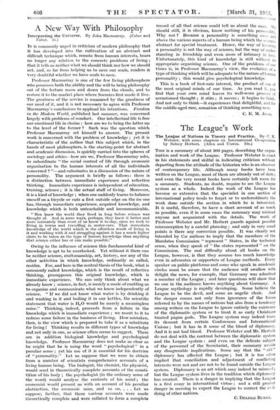A New Way With Philosophy
IT is commonly urged in criticism of modern philosophy that
it has developed into the Cultivation of an abstract and difficult technique which, remote from human interests, bears no longer any relation to the concrete problems of living ;
that it tells us neither what we should think nor how we should act, and, so far from helping us to save our souls, renders it Very dOubtful whether we have souls to save.
Professor Macmurray is one of the few living philosophers who possesses both the ability and the will to bring philosophy
out of the lecture room and down from the clouds, and to restore it to the market place where Socrates first made. it live. The greatness of the service is measured by the greatness of our need of it, and it is not necessary to agree with Professor Macmurray's conclusions to applaud his intentions. Freedom in the Modern World, published last summer, was concerned largely with problems of conduit. Our intelleetital life is free
our emotional life in chains ; how are we to bring the latter up to the level of the former ? Such was the question which Professor Macmurray set himself to answer. The present work is concerned with the problem of knowledge ; yet it is characteristic of the author that this subject which, in the hands of most philosophers, is the starting-point for abstract and academic discussion, is quickly carried into the spheres of sociology and ethics—how are we, Professor Macmurray asks, to subordinate " the social control of life through economic organization to the human• interests of all the individuals concerned ? "—and culminates in a discussion of the nature of personality. The argument is briefly as follows : there is a distinction between immediate experience and reflective thinking. Immediate experience is independent of education, training, science ; it is the actual stuff of living. Moreover, it is a kind of knowledge ; when one suddenly learns to balance oneself on a bicycle or cuts a first outside edge on the ice one has, through immediate experience, acquired knowledge, and knowledge which is both unteachable and incommunicable.
" Men knew the world they lived in long before science was thought of. And in some ways, perhaps, they ]mew it better and more intimately than most of us know it to-day, since we took to living in towns and travelling in motor-cars. That immediate knowledge of the world which is the effortless result of living in it and working with it and struggling against it has a muoh higher claim to be taken as the type of human knowledge than anything that science either has or can make possible."
Owing to the influence of science this fundamental kind of knowledge is apt to be overlooked. Yet without it there can be neither science, craftsmanship, art, history, nor any of the other activities in which knowledge, ordinarily so called, resides. For, and here is the central thesis of the book, what is commonly called knowledge, which is the result of reflective thinking, presupposes this original knowledge, which is immediate experience. We can only think about what we already know ; science, in fact, is merely a mode of enabling us
to organize and communicate what we know independently of science. " If we did not know what water is by drinking it and washing in it and boiling it in our kettles, the scientific statement that water is H50 would be merely a meaningless noise." Thinking, indeed, proceeds from a failure in the knowledge which is immediate experience ; we resort to it to
redress some failure in the business of living. How mistaken, then, is the view which is prepared to take it as a substitute for living I Thinking results in different types of knowledge and not only in one, as science often, seems to suggest. There are in addition biological knowledge and psychological
knowledge. Professor Macmurray does not make as clear as he might that he is using the word ",psychological " in a
peculiar sense ; yet his use of it is essential for his doctrine of " personality." Let us suppose that we were to obtain from a number of scientists comprehensive accounts of a
living human being. The biologist, the chemist, the physicist, would send in theoretically complete accounts of the consti-
tition of his body ; the psychologist (in the ordinary sense of the word) would analyse the contents of his mind ; the economist would present us with an account of his peculiar abstraction, the economic man, and so on. . . . Let us suppose, further, that these various accounts were made
theoretically complete and were collated to form a complete record of all that science could tell us about the man. we should still, it is obvious, know nothing of his personality. Why not ? Because a, personality is something over and above the various aspects of a human being which the sciences abstract for special treatment. Hence, the way of knowinu a personality is not the way of science, but the way of under- standing in friendship and even more of intimacy in love. Unfortunately, this kind of knowledge is still without its appropriate organizing science. One of the problems of our times is, in Professor Macmurray's view, the evolution of a type of thinking which will be adequate to the nature of human personality ; this would give psychological knowledge.
This is a book of first-rate interest, the product of one of the most original minds of our time. As you read it, you find that your own mind leaves its well-worn grooves of - accustcimed thought ; it stirs ; it moves ; it begins to think. And not only to think—it experiences that delightful, and for the middle-aged rare, sensation of thinking something new.
C. E. M. Jo,th.








































 Previous page
Previous page